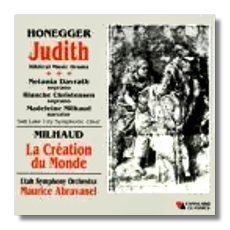
The Internet's Premier Classical Music Source
Related Links
- Honegger Reviews
- Latest Reviews
- More Reviews
-
By Composer
-
Collections
DVD & Blu-ray
Books
Concert Reviews
Articles/Interviews
Software
Audio
Search Amazon
Recommended Links
Site News
 CD Review
CD Review
Arthur Honegger

- Arthur Honegger: Judith
- Darius Milhaud: La Création du Monde
Natania Davrath (Judith)
Blanche Christensen (Servant)
Madeline Milhaud (narrator)
Salt Lake City Symphonic Choir
Utah Symphony Orchestra/Maurice Abravanel
Vanguard Classics OVC8088
After an energetic and deservedly popular recording of Honegger's Le Roi David in 1961 (now available on Vanguard Classics 4038), Abravanel and Vanguard decided to follow it up with of Honegger's Judith. It didn't do nearly as well, but the reasons probably had to do with the contrasting natures of the two works. I suspect much of the affection for Le Roi David stems from its "hits": the choral pieces and the psalm settings. In style, Judith is less an oratorio than an opera, but the libretto (about Judith killing the Assyrian enemy Holofernes with his own sword) is pretty static. Furthermore, its musical idiom is more austere – none of the exuberant diatonic hymns of the earlier work, for example, and far more aggressive dissonance. Nevertheless, Honegger whips up major excitement in his choruses, taking off in his own direction from Stravinskian ostinati and ponderous accents. This is a highpoint of Stravinskian "barbarism," along with such works as Bartók's Miraculous Mandarin and first piano concerto and Prokofieff's second symphony and They Are Seven. The drama is all in the music, rather than in the libretto. Unfortunately, Honegger managed to compose only the short opera Antigone. Yet his oratorios, particularly Jeanne d'Arc au bucher, with a magnificent text by Claudel, stake out new dramatic territory. Judith definitely travels the path to that masterpiece.
The performance has plenty of juice, particularly from Abravanel and the orchestra. I'm not much of a Davrath fan, and Christensen blows her away with a sweeter voice and dead-on intonation. The major disappointment comes from the choir: rhythmically lax, males consistently a quarter-tone flat, and nobody with a clue to French pronunciation. It sounds like the kids in the malt shop, all the more glaring since Davrath, Christensen, and, of course, Milhaud (one of the great French classical stage actresses of her generation) declaim so beautifully. Still, as far as I know, this is the only recording of a fine work.
Milhaud's ballet La Création du Monde has long been a modern classic, a pioneering mix of jazz and classical music. Milhaud had one obvious advantage over most of his competitors. Unlike, say, Stravinsky, he had actually heard American jazz when the time came to write the piece. Curiously enough, conductors tend to fiddle with the instrumentation. Munch, for example, beefed up the string section. Milhaud himself produced several alternative scorings, including one for piano quartet (a favorite of mine). As far as I can tell, Abravanel keeps to the original, although I should mention Arthur Weisberg on Nonesuch (71281-2) as another fine performance. Abravanel keeps up the work's forward impulse, with an opening line that seems to go on forever, but the ensemble occasionally becomes muddy, particularly in the softer wind sections, and I'd prefer a greater jazz inflection. Still, the players show great spirit.
Sound either improves upon the original LPs, or my turntable and cartridge were no damn good in the first place. In other words, you don't have to feel like you're "slumming" with inferior sound.
Copyright © 1996, Steve Schwartz


















